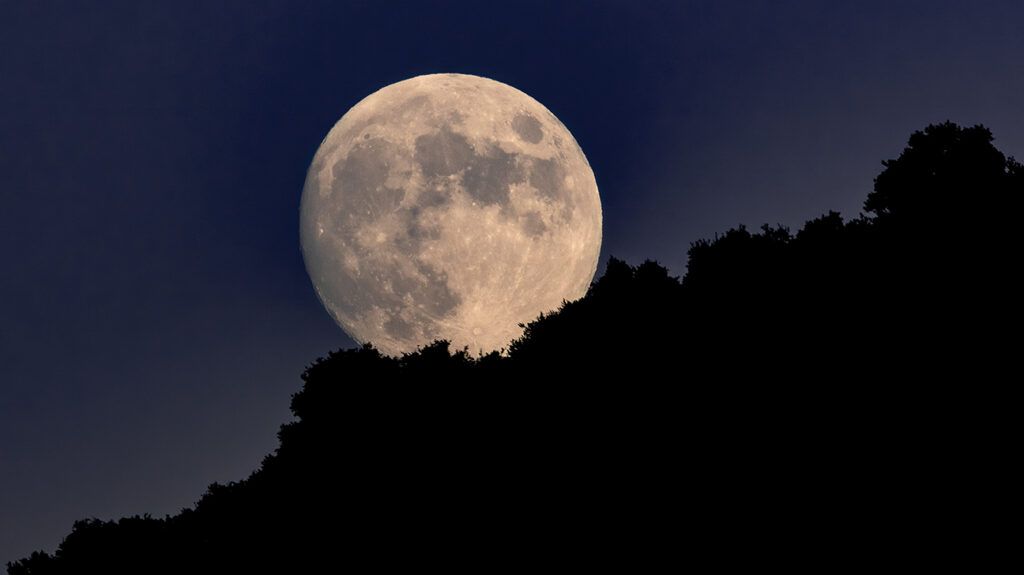The full moon can affect people with bipolar disorder due to moon tides disrupting sleep patterns — light therapy can help you cope.

Moon cycles are often associated with a variety of mental health and physical health conditions. Full moons, in particular, are associated with long-standing beliefs of increasingly erratic behaviors. Research doesn’t back up this claim.
But some evidence supports a link between moon cycles and rapid cycling in bipolar disorder. If you have bipolar disorder, the phases of the moon may affect you more than other people. Although you can’t change the moon’s cycles, there are ways to cope with the mood changes lunar cycles could bring.
If you have a diagnosis of bipolar disorder, you may wonder if the full moon affects you. The moon’s tides may align with bipolar cycling. A
The study above also found that sleep disruptions may occur from a small group of nerves synchronized with lunar patterns that can quickly trigger cycling between depression and mania.
Can a full moon spur manic episodes?
The full moon might start the
Depression during full moon
As mentioned in a
Anxiety and moon phases
There is little evidence to support that the full moon phases affect anxiety.
In fact, one older research study examining the effects of the full moon on psychiatric emergency department presentations found that fewer people with anxiety disorders reported to the emergency department during full-moon periods than during non-full-moon periods.
If you have a bipolar disorder diagnosis and notice a connection between your mood and lunar phases, there are some ways to cope effectively.
Light therapy
Light therapy boxes are devices that mimic natural sunlight and can help replace natural light. If you have bipolar disorder, you might likely be susceptible to environmental stimuli that can alter your circadian rhythm.
Light therapy might be effective, especially for people who experience bipolar depression.
A different 2017 study examined the effectiveness of light therapy. One group of participants with bipolar disorder received exposure to dim red light. Another group with the same condition received bright-light treatment. The benefits of bright-light treatment found in the study included:
- an antidepressant response in people with depression symptoms
- lowered levels of depression
- improved overall functioning
- no mood polarity switch
The above results occurred after the participants received 6-weeks of bright-light therapy at midday.
Evaluating your medications
One 2019 case study of a person with rapid cycling bipolar disorder suggested that examining medications may be helpful during periods of the full moon because there were significant differences in thyroid levels, and the effects of antidepressants differed.
Although there’s little research on this topic, if you notice drastic mood changes during the full moon, it may be helpful to talk with a doctor about your medications.
Lunar cycles affect the human brain.
Though many people think that full moons cause a rise in crime, psychiatric admissions, and suicidality, research doesn’t support this. Nor does this
Research does support that there are changes in the human brain structures dependent on the lunar cycle.
For example, one small 2022 study with 15 healthy individuals found differences in the size and volume of brain structures across the four lunar cycles, such as the:
- hippocampus
- thalamus
- trigone
- whole-brain volume
- ventricular volume
- lentiform nucleus
How full moons affect many folks
The full moon can affect you — regardless of whether you live with a mental health condition — in subtle ways, such as:
- differences in sleep patterns before the full moon
increases in fall injuries in rural areas - changes in the onset of sleep before the full moon
Most other popular beliefs and lore around the full moon have little evidence.
For years, many misconceptions arose about the full moon causing madness.
However, research consistently shows subtle links between the full moon and human behavior. Bipolar disorder may be one exception, as a small sample size demonstrated that moon tides can spark rapid cycling in folks with bipolar disorder.
If you have bipolar disorder and the moon’s phases affect you, you can cope with light therapy or by evaluating the effectiveness of your medications.
You aren’t alone if you manage bipolar disorder — you may need some extra self-care during the full moon cycle.
